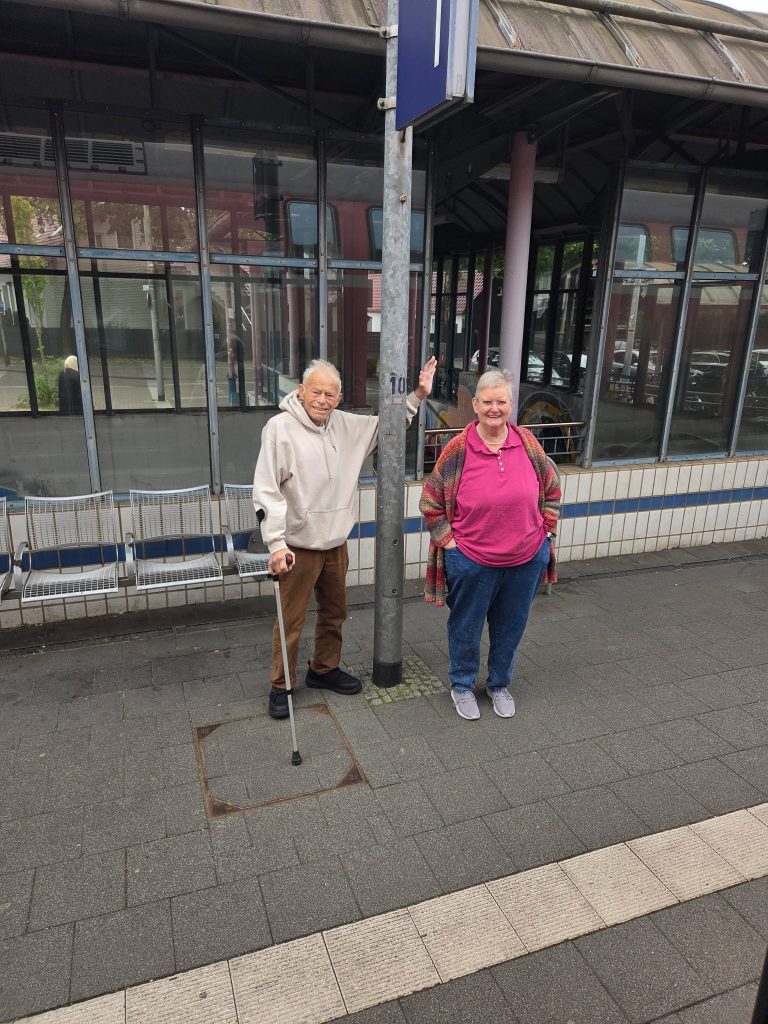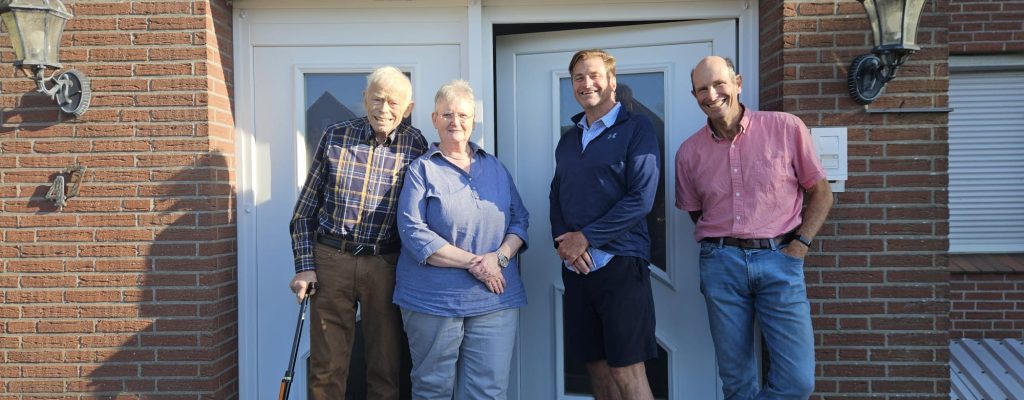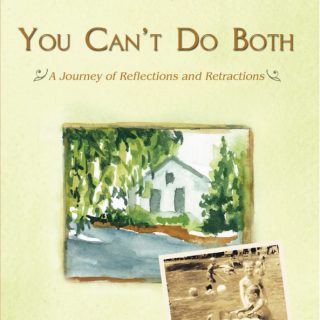The train was almost to the end of the line of a journey that began in Munich. The long tram was preparing to pull into the small German village of Achim located in the north part of today’s Germany. The village is located 500 miles north of Munich and is 300 miles east of Berlin. Touring Germany’s two most renowned cities was the main motivation that had taken me across the pond in search of “a how does it look now” moment. I was ambiguous in regard to any expectations, or answers I might find in the landscape, or in the people’s faces. It had come to the time in my travails to visit the cousins from my dad’s side. The part of my excursion that was the make-or-break period for achieving the purpose of this long search. I was with my brother looking into an ancestral past that haunted me.
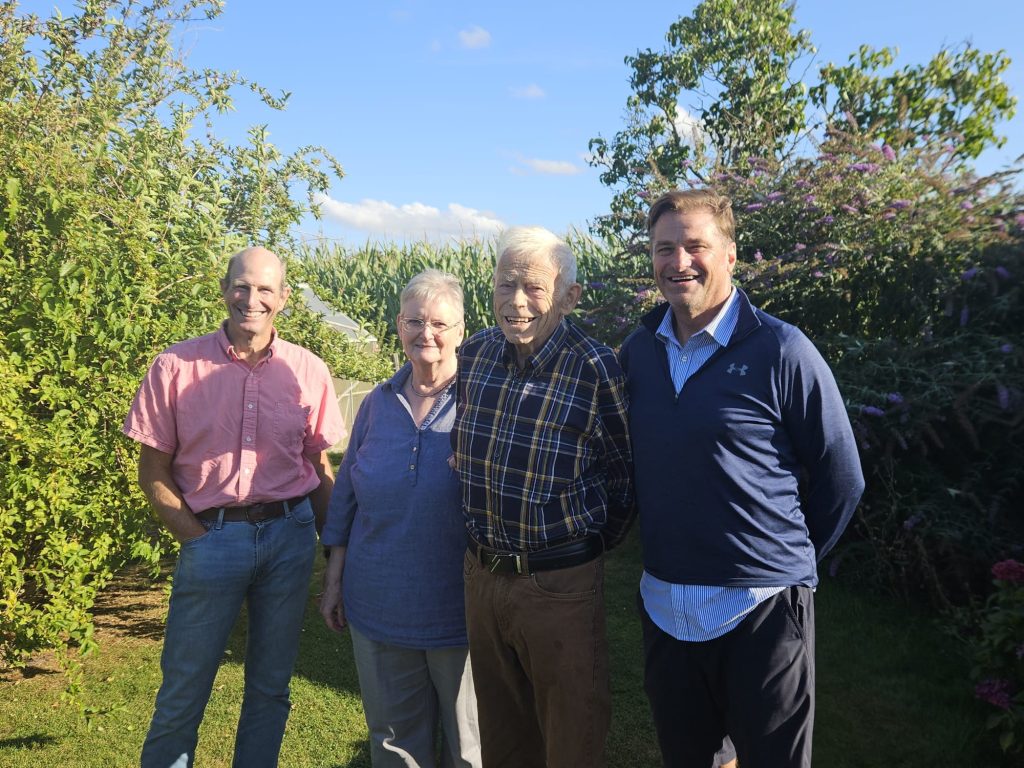
I had come to Das Vaterland for one main reason; to research the project I am currently committed to. My brother Gary, who has traveled the entire world a few times over, had convinced me that my stubbornness in rejecting all of his offers to show me the places he had lived in at various times had to come to a halt. (Munich, Manchester, Dubai, Hamburg etc…. ). My brother Gary insisted that I must go to Germany if my work in progress was to have credibility. But I knew his top-of-mind goal was to for him to get me to a place I had told him many times prior, ‘I will never go.’.
After three days of walking the Munich Streets, in a city that physically shows very little signs of the devastation inflicted on it during the two world wars, Gary and I were headed towards Berlin as the next stop in helping me put together the puzzle which I was half way through.
In between our excursions in Munich and Berlin Gary arranged for a five-hour train ride from Munich To Achim. We were headed north to visit the residence of the only member of my extended family that I had any recollection of hearing about, or recall being in their presence during my youth.
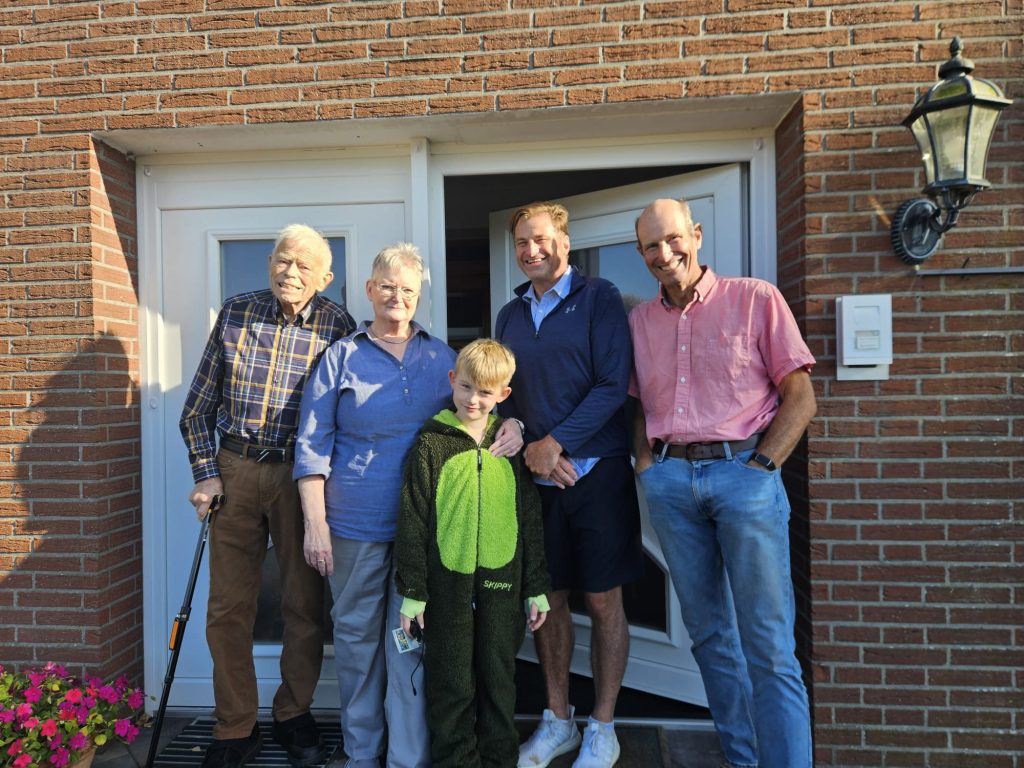
Throughout my life I have felt a strange reluctancy to go back into my ancestry for reasons that psychologists could possibly describe as deep seeded guilt. I looked into the German countryside to see the cornfields, the graffiti that clustered the sound wall barriers, and of course the throngs of forever windmills. (Germany has the most windmills of any country in the world). There was no more a sign than the unsightly windmills as the latest symbol that reminded me that the wars in Germany may have taken a hiatus. These green new deal monstrosities confused an already battered landscape. I had not come to Germany to comment on the green new scam or the mood of Germany in 2025. I was there to go back in time. All the way back to Germany before the Great Wars.
Gary stepped off the train in front of me. “Alfred,” my brother’s one word brought me back to 1967, Halsey Street in Brooklyn New York, I was a seven-year-old taking in the big apple for the first time at my dad’s parents (my grandparents) one bedroom flat. I loved going to Halsey Street as a kid. The ice cream truck came singing daily in the midafternoon. I watched the older kids drop their broom handle stickball bats to the pavement and begin a race towards that alluring sound. I remember the Strategos games, sleeping on the pullout in the sitting area, and listening to all the sounds the city makes when the streetlights come on. But most of all I could remember Uncle Alfred. The young man with a big smile, a bit of a German accent and the bluest pair of eyes I had seen or seen since. Alfred was 10 years younger than my dad and he lived one floor above my grandmother with his mother Anna and his siblings. Tanta Anna was my grandmother’s sister making Alfred and my father’s first cousins
For myself stepping off the train in Achim Germany marked 60 years since having any contact with a relative of my extended family.. At first glance I recognized my Uncle Alfred. “This is Richard. The one who’d stick his fingers in my beer and then lick his fingers,” Alfred was pointing his cane directly at me while letting out a laugh like he used to when he would catch me in the act all those years ago.
I had been in Alfred Grashoff presence as a boy on several occasions. Alfred’s Mother, Anna, left Germany shortly after the end of the second world war. In the winter of 1944 Anna Grashoff became a widow and her three children were fatherless. Anna’s husband Yan was shot and killed as he advanced towards Moscow as part of the Nazi army. Many Germans, who could find the means had escaped their war tattered country that was on the verge of repeating its mistake. Alfred’s mother booked passage to America along with her sons Alfred and Freidel and their sister, Ingrid. They settled in Brooklyn New York, on Halsey Street, in an apartment directly above Margaret Siegel, Alice’s sister who had come to America in the early 1920’s. It was a time between the world wars, and the beginning of the Great Depression.
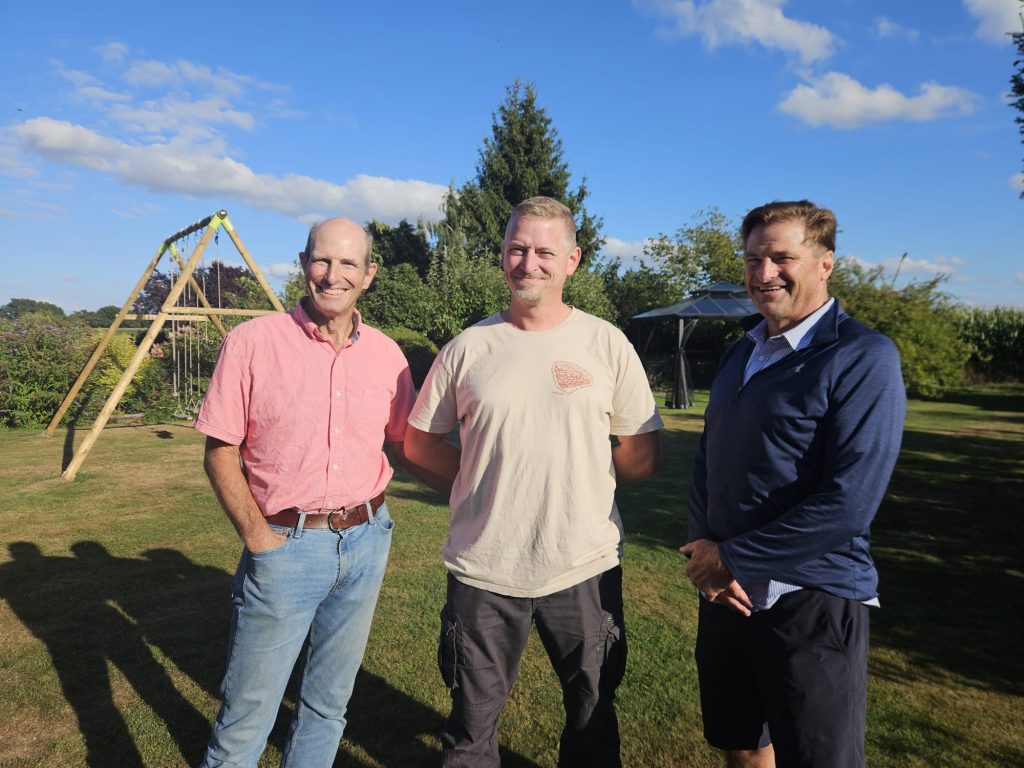
I gingerly stepped off the train, then peered around my big brother’s shoulder and immediately recognized the only extended relative my father had paid any mind to. Alfred Grashoff had not changed one dimple in my 60-year-old eyes. His round jovial face may have had a few bumps and curves running through it but that wide smile still handsomely accented his broad cheek bones.
”Alfred.” Was the extent of my greeting. “Richard.” Alfred responded extending his hand in a kind of a half handshake half embrace. (Germans are not big huggers) Alfred repeated the story of my fingers in his suds.
This was my brother Gary’s third visit to Achim to see Alfred and his wife of 36 years, Margaret. The four of us hopped into Alfred and Margaret’s American utility vehicle heading home to a place I was as sure as I had been before as I was I hadn’t.
“Are we on the Autobahn.”? I asked Margret who was locked in on the road traveling at what felt like the speed of light.
”Yah,” she said with a sly smile. “I am only doing 120 kilometers per hour.” (80 miles per hour).
I made sure my seatbelt was secured and stared out the window as Margaret kept driving deeper and deeper into the past.
Margaret slowed the car onto a back road somewhere in the farmlands of Northern Germany.
”That is where your great grandmother spent her childhood.,” Alfred spoke up. I looked out to the tan stucco house where a woman was tending to her laundry in the wind. I took a long breath, felt all that might have been flash before my eyes. This was the place I saw in my dreams. This was the spot I spent my entire life looking for.
After about 30 minutes of cruising the old neighborhood Margaret was slowing the car down on a small residential street not that dissimilar from the one, I grew up on in back in the states.
Over the years my brother had invited me to go with him and visit our German roots several times . Each time I said ‘no way.’
But being in Germany was not the first thing I had said I would say “never” to, and yet there I was.
I got out of the back seat of Alfred and Margaret’s rustic colored 4-wheel sport ranger and put my foot down on the soil of my father’s ancestors.
After meeting Yan Grashoff (Alfred and Maragret’s son’s ), Yán’s wife Gina, and their three children who ranged from age four through nine, we got the full tour of the old farmhouse that Alfred’s father, and his father before him, claimed as the Grashoff estate.
We walked by a swimming pool where Alfred’s grandson splashed with a friend after just completing their first day of school. We walked past a garden filled with ripe tomatoes that were on the other side of a fence that separated the Grashoff backyard from thousands of rows of corn stalks.
“I still was doing lots of gardening up until last summer. This knee had enough, and it was time,” My Uncle Alfred said leaning on his cane and pointing to the brace on his knee.
The living room area was decorated with a German butter cake and an assortment of fresh baked cookies.
“Alfred may not drive any more but every morning he is the first one up. He takes his bike to the bakery about half a mile away each morning and comes back with our breakfast and breads for the day,” Margaret explained in clear English.
It did not take long before we were sharing the stories that I had spent a lifetime avoiding. Why had my father been so subtlety ,or according to Alfred not so subtlety, reluctant to embrace his German ancestry? Maybe this was what connected to my own self putting my head in the sand when it came to my hidden guilt. When I was a child, I remember extended relatives talking only in German about the bright days back in Das Vaterland before the wars.
”Randolph, (My dad) didn’t want much to do with his German roots,” said the only relative who my father spoke about in affectionate tones. “I don’t know all his reasoning, but your father was a determined American,” by now Alfred was smiling, and his German blues eyes had a twinkle. I had the beginning of the answers I had subconsciously come looking for. Alfred’s story was one gene, a half a generation from being my story. A fatherless boy at birth brought to America as s baby, Alfred attended public schools in America up until he was 16. In 1969 Alfred’s mother Anna decided to return to Germany and the home he and her husband had inherited from his deceased father Yan Grashoff.
Alfred found his way back to the fatherland becoming a tram driver in Bremen. In the capacity of his work, he met his bride of 36 years (Maragret). Their one son Yan, (works for the current German Army) and his wife Gina provided Alfred and Maragret with three grandchildren. Somewhere in the ruins of a full century Maragret and Alfred found each other in the post war, post-depression era of Germany. Alfred had spent his adolescence on Brooklyn’s Hallsey street learning the ways of the American city street from his older cousin Randolph. Alfred chose his words carefully as he spoke of our father in a way I had not heard before.
”I looked up to Randolph. He was a picture of the American dream. I understood why he shied away from his family’s history. He was fortunate to escape the pain caused by the wars and to the German people. I think he felt it and wanted to hide from it. Randolph was always too busy chasing the American dream to find time for old German relatives,” Alfred said it all with a smile filled with the kind of wisdom that is earned. I am not the best listener, but as Alfred spoke his stoic words I fell into a trance. He was answering questions I hadn’t thought to ask.
”Alright that is enough of this deep talk let’s go have some good German food at our favorite restaurant in the village.
After a night filled with stories from a time, I had left tucked away in my subconscious. It was time to board the train to Berlin. Alfred told stories of my father coming of age in America during the great depression and the world war that followed. Stories of Alfred torn between two countries who through it all continued to live life with a glass half full every time despite all the obstacles that came. A story of returning to Germany and rebuilding what had been destroyed, no fault of himself.
Margaret and Alfred were at our hotel first thing in the morning to take myself and my brother to the train station. The car ride was much less boisterous than the night before.
”Have you guys been to Berlin?,” I asked about our next destination.
”Once or twice they collectively answered without enthusiasm .” ‘Oh, I get it,’ I said only to myself.
We all exchanged more passionate hugs then the fragile embraces from the day before as me and Gary dragged our processions through a Friday morning train station
”Tell them what you saw Richard. And come back with the story,”
’I will Alfred. I will.’
I was on the train pressing my face to the tram’s oversized windows and waving my open right palm.
Alfred and Margaret were by now out of sight.
We had promised to meet again.
I will forever see my Uncle Alfred’s blue eyes.
